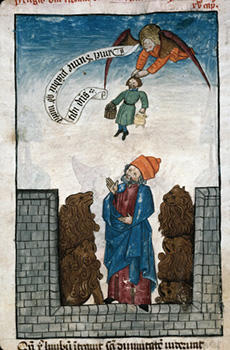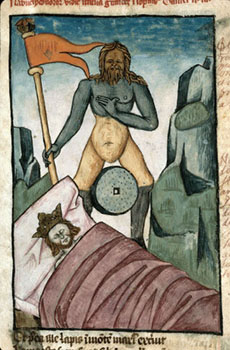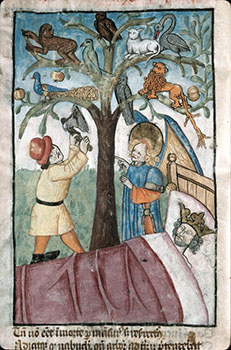From Our Archives
Debie Thomas, Pouring Out My Soul (2021); Debie Thomas, Not One Stone (2018).
This Week's Essay
Mark 13:17, How dreadful it will be in those days!
For Sunday November 17, 2024
Lectionary Readings (Revised Common Lectionary, Year B)
1 Samuel 2:1–10 or Psalm 16
Hebrews 10:11–14 (15–18), 19–25
Mark 13:1–8
As if right on cue, two of the lectionary readings this week are apocalyptic texts — Daniel 12 and Mark 13. With the election of Donald Trump as president, half of the United States is wondering if we have descended into a political apocalypse. Of course, this would be equally true for the other half of the country if Kamala Harris had been elected.
But let's be clear — millions of people today aren't just wondering about an apocalypse, they are living and dying in one, in the Middle East, Ukraine, and Sudan. Entire countries (not just half!) look like places of unanswered prayers.
Apocalyptic literature is a genre that flourished from about 200 BC to 200 AD among both Jews (Joel, Zechariah, and Daniel 7–12) and Christians (Mark 13 and Revelation). It is characterized by visions, symbols, numerology, surreal beasts, and sea monsters. Apocalyptic literature is wildly strange, but it does something wonderfully beautiful: it imagines a dramatic reversal to a deeply troubling issue — the painful disconnect between the righteousness of a good God and all the evil in the world.
The apocalyptic passage in Mark 13:1–37 for this week was so important to the early church that it's repeated in both Matthew 24 and Luke 21. The narrative begins with Jesus predicting the destruction of the temple in Jerusalem, and then it expands to describe the end of all human history. Daniel 12 and Mark 13 call these "dreadful days of distress" that will be unequalled since the beginning of time. In response to the impending apocalypse, Jesus encourages his followers with two pieces of advice.
 |
|
Daniel in the lion's den.
|
In Mark 13:7 and 11, Jesus tells us, "don't be afraid." Don't be frightened or alarmed, don't be worried or anxious. I especially like the translation of the parallel passage in Luke 21:9 by the NASB, "don't be terrified." Given the things that Jesus predicts — famine, war, earthquakes, imprisonment, torture, and more, this feels like wildly counterintuitive advice. It also feels like what I need to hear: don't be afraid. Instead, trust the mysterious providence of a loving God. Pray for Jesus's promise of the "peace that the world cannot give."
When the record producer Quincy Jones (1933–2024) died two days before the election, many of the obituaries quoted him as saying, "Every day you have to make a choice between love and fear. As much as you can, choose love." That's what I'm trying to do these days.
And then secondly, at least eight different times in Mark 13, Jesus tells us, "don't be deceived." Watch out. Be on your guard. Take heed. Be alert. Keep watch. In other words, he calls us to vigilance and discernment, especially in light of all the many reckless lies and false promises that will characterize "the ends of the age." Don't be duped, deceived, or distracted. Live in reality. Keep things in perspective.
 |
|
Book of Daniel, Nebuchadnezzar's dream of a statue.
|
The day before the election, I watched an interview with the Pulitzer Prize winning historian Doris Kearns. She was deeply disturbed at the possibility of a Trump presidency. But she also encouraged viewers to be circumspect instead of alarmist. She observed how the United States has suffered far worse "apocalyptic" periods, like slavery and the Civil War (800,000 deaths), the Great Depression, two World Wars, and Vietnam. The people who were living through those "dreadful days of distress" had no idea how, or even whether, things might resolve. But these catastrophes did resolve, and so we hope for the same in the United States and all-around the world today.
Maybe it's because I'm a worrier, or because I did a deep dive into Irish history and poetry before I hiked in Dublin last month, but all during the election season I got fixated on the famous poem by William Butler Yeats called The Second Coming (1919). The poem was written in the dark shadows of Ireland's Easter Uprising in 1916, the 1917 Russian Revolution, and the end of World War I in 1918. It describes a terrifying nightmare of a post-Christian apocalypse, in which a "pitiless" beast "slouches" toward the sacred city of Bethlehem.
Second Coming
Turning and turning in the widening gyre
The falcon cannot hear the falconer;
Things fall apart; the centre cannot hold;
Mere anarchy is loosed upon the world,
The blood-dimmed tide is loosed, and everywhere
The ceremony of innocence is drowned;
The best lack all conviction, while the worst
Are full of passionate intensity.Surely some revelation is at hand;
Surely the Second Coming is at hand.
The Second Coming! Hardly are those words out
When a vast image out of Spiritus Mundi
Troubles my sight: somewhere in sands of the desert
A shape with lion body and the head of a man,
A gaze blank and pitiless as the sun,
Is moving its slow thighs, while all about it
Reel shadows of the indignant desert birds.
The darkness drops again; but now I know
That twenty centuries of stony sleep
Were vexed to nightmare by a rocking cradle,
And what rough beast, its hour come round at last,
Slouches towards Bethlehem to be born?
 |
|
Book of Daniel, Nebuchadnezzar's dream of a felled tree.
|
Ironically enough, the more I meditated on this poem, and reflected on my hike in Ireland and the history I had read beforehand, I concluded that however much this poem channels my feelings of dread, Yeats was wrong. The apocalypse that his poem envisions might have lasted for a time, but his beloved Ireland has evolved into the remarkable "Celtic Tiger" that tourists from all over the world flock to today. You can read about this in the award-winning book by Fintan O'Toole called We Don't Know Ourselves (2021).
So, don't be afraid. Don't be deceived by reckless lies and false promises. Instead of the ominous Yeats, I'm now meditating on his fellow Irish poet Seamus Heaney, who in his little poem Voices from Lemnos writes, "History says, Don't hope / On this side of the grave, / But then, once in a lifetime / The longed-for tidal wave / Of justice can rise up / And hope and history rhyme."
Weekly Prayer
Laura Kelly Fanucci
When this is over,
may we never again
take for granted
A handshake with a stranger
Full shelves at the store
Conversations with neighbors
A crowded theater
Friday night out
The taste of communion
A routine checkup
The school rush each morning
Coffee with a friend
The stadium roaring
Each deep breath
A boring Tuesday
Life itself.When this ends
may we find
that we have become
more like the people
we wanted to be
we were called to be
we hoped to be
and may we stay
that way — better
for each other
because of the worst.Laura Kelly Fanucci is a writer and the director of the Communities of Calling Initiative, housed at the Collegeville Institute at Saint John's University. She earned her Master of Divinity from Saint John's School of Theology and her BA from the University of Notre Dame. Laura is an award-winning columnist for Catholic News Service, and her nationally syndicated “Faith at Home” column runs monthly in Catholic newspapers across the U.S. Her writing has been featured in numerous online outlets including NPR’s On Being, the Christian Century, and Blessed Is She. Laura has authored six books, including Grieving Together: A Couple's Journey through Miscarriage.
Dan Clendenin: dan@journeywithjesus.net
Image credits: (1) Wikipedia.org; (2) Wikipedia.org; and (3) Wikipedia.org.





